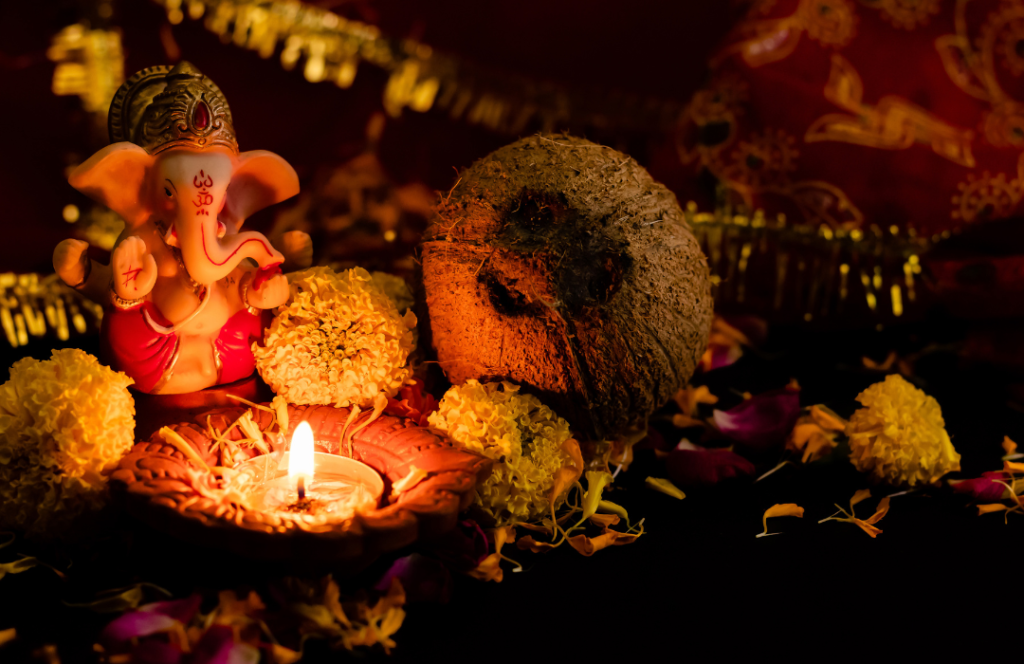Scientific and Spiritual Benefits of Performing Daily Pooja
Performing daily pooja (also spelled puja) is a timeless tradition deeply embedded in Hindu culture. While the spiritual significance of daily worship is well known, modern science also validates many of its benefits. From enhancing mental clarity to improving emotional balance, daily pooja rituals are more than just a religious practice — they are tools for holistic well-being.
Let’s explore how this sacred ritual bridges spiritual devotion with scientific wellness, and why incorporating pooja into your daily life can be transformative.
🕉 What is Daily Pooja?
Daily pooja refers to the act of worshipping the Divine every day, typically performed at a personal home altar. It includes:
Lighting a lamp (Deepam)
Offering flowers and food (Naivedyam)
Chanting mantras or prayers (like Vishnu Sahasranamam or Lalitha Sahasranamam)
Meditation and mindfulness

🔬 Scientific Benefits of Performing Daily Pooja
1. Reduces Stress and Anxiety
Chanting mantras and focusing on a deity during pooja activates the parasympathetic nervous system, promoting relaxation. The repetition creates a meditative state, calming the mind and reducing cortisol (stress hormone) levels.
2. Enhances Focus and Mental Clarity
Performing rituals daily improves attention span, mindfulness, and discipline. Scientific studies on meditation show that consistent spiritual routines enhance neuroplasticity — the brain’s ability to adapt and grow.
3. Balances Emotions
Lighting a lamp and sitting in silence helps regulate emotions. It offers a structured pause, allowing emotional reset, especially after a hectic or overwhelming day.
4. Boosts Immunity and Health
The scent from incense sticks (like sandalwood and camphor) has been found to have antibacterial and purifying effects. Breathing in these natural aromas can improve air quality and respiratory health.
5. Improves Sleep Quality
Evening poojas, combined with chanting or soft bhajans, signal the body to wind down, balancing melatonin and promoting restful sleep.
🧘♂️ Spiritual Benefits of Daily Pooja
1. Deepens Divine Connection
Daily pooja serves as a spiritual discipline that fosters devotion (bhakti) and brings the individual closer to the divine, nurturing the soul’s longing for peace and purpose.
2. Cleanses the Aura and Environment
Burning camphor or dhoop during pooja not only purifies the physical space but also helps cleanse negative energies, creating a sacred and peaceful atmosphere.
3. Builds Positive Karma
Regular devotion is said to create good karmic imprints. Consistent prayer and offerings build compassion, gratitude, and humility — qualities that elevate one’s spiritual journey.
4. Aligns Mind, Body, and Spirit
Daily rituals help synchronize the five elements (Pancha Bhootas) within us. This alignment improves overall harmony and promotes spiritual evolution.
5. Creates a Sense of Belonging and Purpose
Pooja gives people, especially in families, a shared sense of tradition, values, and rootedness in spiritual culture.
🪔 Why You Should Start Performing Daily Pooja
Whether you are religious or spiritual, daily pooja can help you:
Establish a peaceful start to your day
Build a regular habit of mindfulness
Stay grounded amid modern-day chaos
Feel more centered and emotionally stable
You don’t need a complex ritual to begin. A simple offering of light, flowers, and sincere prayer is enough to bring divine grace and inner strength.
Explore: Book Pooja Services Online with Trusted Vedic Priests
✨ Conclusion: Bring Light Into Your Life with Daily Pooja
In today’s fast-paced world, daily pooja offers a powerful blend of spiritual depth and scientific wellness. Whether you’re seeking inner peace, stronger mental health, or divine blessings, this daily ritual can be a game-changer.
🙏 Start today with a small commitment — light a diya, close your eyes, and offer your heartfelt prayer. Let the divine energy guide you every day.
✅ Call to Action:
Ready to make your daily pooja more meaningful?
Explore Poojavara’s Pooja Kits & Book a Vedic Purohit Online
FAQs
Daily pooja improves mental peace, reduces stress, strengthens spiritual connection, and purifies your home environment.
Yes, scientific studies support that chanting and meditation during pooja reduce anxiety, improve brain function, and enhance emotional health.
Absolutely. A simple routine with lighting a lamp, chanting a mantra, and offering gratitude is enough to reap the benefits.
Ideally during Brahma Muhurta (early morning before sunrise) or Sandhya Kala (sunrise/sunset), when spiritual energies are at their peak.
It instills discipline, cultural values, emotional intelligence, and a sense of belonging from a young age.


